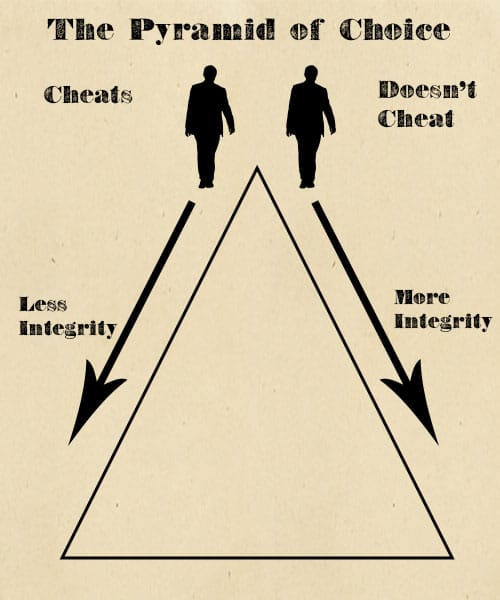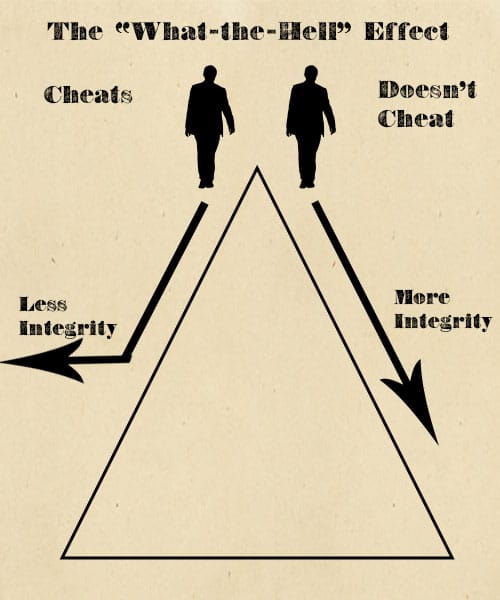1. Compromising our integrity begins with the small things. Just like the businessman that steals millions through fudging numbers, our addictive behaviors start by fudging a cent here and a cent there. A huge part of recovery for me has been recognizing where I fudge those cents and then fixing them immediately instead of justifying them as only a few cents.
I like this analogy he shares from a book:
"two college students who find themselves struggling on an exam that will determine whether or not they get into graduate school. They are 'identical in terms of attitudes, abilities, and psychological health,' and are “reasonably honest and have the same middling attitude towards cheating.” Both students are presented with the chance to see another student’s answers and both struggle with the temptation. But one decides to cheat and the other does not. 'Each gain something important, but at a cost; one gives up integrity for a good grade, the other gives up a good grade to preserve his integrity.'
When you make a mistake or a choice that’s out of line with your values, a gap opens up between your actual behavior and your self-image as a good, honest, competent person. Because of this gap, you experience cognitive dissonance – a kind of mental anxiety or discomfort. Since humans don’t like this feeling of discomfort, our brains quickly work to bridge the divide between how we acted and our positive self-image by explaining away the behavior as really not so bad after all.
Thus the student who decided to cheat will soothe his conscience by telling himself things like, “Idid know the answer, I just couldn’t think of it at the time,” or “Most of the other students cheated too,” or “The test wasn’t fair in the first place – the professor never said that subject was going to be covered.” He’ll find ways to frame his decision as no big deal.
The student who didn’t cheat, while he won’t experience the same kind of cognitive dissonance as his peer, will still wonder if he made the right choice, especially if he doesn’t get a good grade on the exam. Feeling uncertain about a decision can cause some dissonance too, so this student will also seek to buttress the confidence he feels in his choice by reflecting on the wrongness of cheating and how good it feels to have a clear conscience.
As each student reflects on and justifies his choice, his attitude about cheating and his self-perception will subtly change. The student who cheated will loosen his stance about when cheating is okay, and feel that there’s nothing wrong with being the kind of person who does it a little for a good reason; his ability to rationalize dishonest choices will go up and so will his fudge factor margin. The student who maintained his integrity will feel more strongly than before that cheating is never acceptable, and his ability to rationalize dishonesty will go down, along with his personal fudge factor margin as well. To further decrease the ambiguity and increase the certainty each student feels about their divergent decisions, they will then each make more choices in line with these new stances."
Like each of the students, each of us decides to "cheat" for one reason or another. The little cheats are the road to relapse. They lead us down the path of less integrity while decisions not to cheat lead us down the path of more integrity.

Similarly, he describes a phenomenon all too familiar to addicts that they call the "what the hell" effect. This happens when we get to a point of acting out and say, "well... I've already acted out, might as well go all they way. I've already lost." Instead of step by step falling down the slope, we take a direct turn and fall off the cliff. What a lie! Well... I accidentally had a little bit of chocolate so I might as well eat the whole cake! I missed one question so I might as well screw up the whole test! I didn't exercise today so I guess I should just never exercise again!

2. Integrity can be rebuilt. Just as making poor decisions hurts our integrity, making good decisions builds it back up. As weak and poor as our integrity is at the beginning, we can make those difficult decisions early on. We can choose the difficult choice with the greater immediate consequence but much less severe long-term consequence. We can keep the rules we've set. We can pray in a time of trouble. We can come clean immediately after acting out. We can be accountable. We can not justify the little "cheats" that inevitably lead to acting out.
I've seen this as I have sought recovery. It's been a long, hard road (and still is), but I believe I have regained a certain measure of integrity that I haven't had in years. Maybe ever. I now find myself being almost hyperactive to even the smallest dishonest decision. Because I know, if I am dishonest in one thing, I can easily become dishonest in all things. My conscience has become hyperactive, and I'm still learning to control it, but it's much better than the hypoactive state is has been in for years.
Anyway, I think he summarizes my favorite parts in this paragraph:
Once you commit one dishonest act, your moral standards loosen, your self-perception as an honest person gets a little hazier, your ability to rationalize goes up, and your fudge factor margin increases. Where you draw the line between ethical and unethical, honest and dishonest, moves outward. From his research, Ariely has found that committing a dishonest act in one area of your life not only leads to more dishonesty in that one area, but ends up corrupting other areas of your life as well. “A single act of dishonesty,” he argues, “can change a person’s behavior from that point onward.”
If we are to recover, we must become honest in ALL areas of life... not just with addiction. Any lie or dishonesty that we let slide is toxic to our integrity. Two times while assisting surgery I have accidentally touched something not sterile, which means I have to ungown and re-scrub in, and most attendings will tell you not to bother. I wanted to stay because maybe I'd get to help with the surgery. I thought of lots of rationalizations, but in the end determined that I would not touch a patient while not sterile. I'm sad that it was a struggle, but happy to report that I kept that decision. I need to do better though so that it gets to the point where it's not even a struggle. A little while ago I littered in a parking lot and didn't do anything about it. I went back and filled a grocery bag full of garbage later to make up for it. My wife and I found an extra $20 groupon to a restaurant because they didn't redeem our last one - but we're not going to use it. The same can be said for our rules of not surfing the web, only doing the essential things online while my wife is not home, never using computer after wife goes to sleep, and other rules. Call me crazy, but this is the type of person I need to be if I am going to regain my integrity.
I pray God continues to bless me as I seek to rebuild the integrity that I have lost in lies and addiction. The beauty is that it is possible - I know that because I've taken the first few steps on that long journey. It's getting easier. I still struggle and have a ways to go, but I am committed to continuing on this path for the rest of my life until it becomes a deep and inseparable part of me.
this is sooooo good thank you for sharing!!
ReplyDeleteI LOVE that website. I'm not a man, but I stinking love that site. I hadn't read this post yet, but now I will!
ReplyDelete